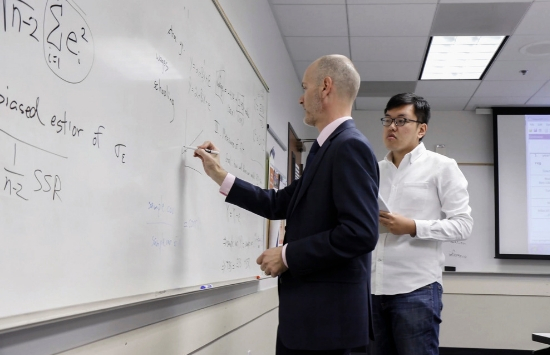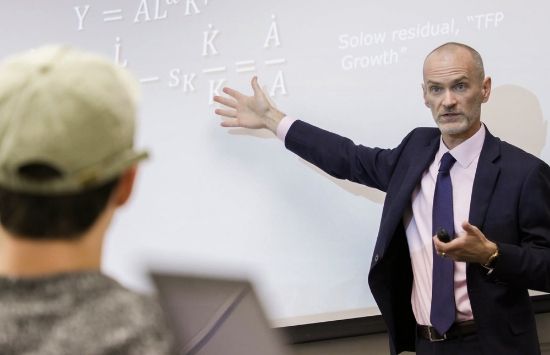Comparing our MPP to a Master's in Economics

The economic approach to policy analysis is all about investigating whether a given policy will accomplish its goal in an efficient and equitable manner. Sounds straightforward, right? Not necessarily, and that is why applied economic policy is such an interesting specialization in our Master of Public Policy (MPP) program.
First, note that the "applied" in the name means that while students learn some economic (or econometric) theory, the goal is always to apply the knowledge to actual policy issues out there in the world. This isn't a PhD program in economics (although some of our best students have gone on to get a PhD; more on that below).
What is Applied Economic Policy?
-
Analyzing the economics of a proposed policy solution involves such questions as:
-
Will the economic policy solve the intended problem? It isn't enough to have good intentions or to hope a policy will work. The policy analyst can use the economic way of thinking to discover likely outcomes based on economic theory, past experience with related policies, and quantitative economic analysis (econometrics).
-
What will the unintended consequences be? There will almost always be some, and they create problems that are as bad or worse than the original problem. The Great Society welfare programs, the War on Drugs, and strict regulations on hazardous waste disposal all provide examples of policies with unintended consequences (namely, encouragement of the breakdown of the family, violence that devastated many minority communities, and "midnight dumping" of waste in unsafe locations, respectively).
-
Who will be better off under the proposed economic policy? Who will be worse off? How do these gains and losses compare? Many things in life cannot be quantified, but many can (and probably more than you think, if you have never studied economics). Measuring costs and benefits helps both to analyze whether a policy should be adopted and—often more importantly—to what extent a policy should be applied. An example here is a carbon tax: Should we have one? If so, what should the tax rate on a pound of carbon emissions be?
-
Is the policy politically feasible? While other parts of our MPP program also address this question, the economic policy analyst also considers the lessons that political economy offers.

How we teach Applied Economic Policy at Pepperdine School of Public Policy
At the Pepperdine School of Public Policy (SPP), students enrolled in the Applied Economic Policy MPP specialization can expect the following:
-
Every student takes core classes in microeconomics (MPP 602) and macroeconomics (MPP 605). The former class introduces students to economic reasoning useful for investigating policy problems, and focuses on decisions made by individual people and companies meeting in economic markets. The latter class acquaints students with principles of macroeconomics, which involves the government's role in and the effects of fiscal and monetary policy.
-
Master of Public Policy students wishing to specialize in Applied Economic Policy also all take econometrics (MPP 622), which provides a set of statistical tools that are necessary for empirical policy analysis. You've probably heard that "correlation does not mean causality" and that is true. Just because policy A was in place and then outcome B happened most certainly does not mean that we can assume that A caused B. Econometrics is about assessing causal relationships between policy and outcomes, which is necessary if we are going to have any hope of predicting the outcome of a new policy. The "Baby Mozart" fad of a while ago gives a simple illustration of this. There is some evidence that listening to music by Mozart as a child (or even before birth!) is positively correlated with IQ. In response to this, some Southern states distributed free classical music CDs (hey, it was a while ago) to newly born babies. Later research, however, found that the association between the music and IQ wasn't causal. Rather, it is instead likely just a reflection of the fact that parents who play Mozart for junior in the womb are also likely to be of high IQ themselves, and (for whatever reason) IQ is highly heritable. Mistaking correlation for causality often leads to policies that do not fulfill their objectives, because they do not make the desired outcomes any more likely to occur.
-
Then students take a few more electives in applied economic analysis. These classes are most often centered around a particular policy issue. Examples include education, global economic development, policy toward science and innovation, health and healthcare, and environmental economics.
What can I do with an MPP specialization in Applied Economic Policy?
So what do you do when you specialize in applied economic analysis? Many things! Our students over the years have gone on to a variety of interesting public policy career paths:
- Lindsay Kimbro Brooker (MPP '11) became the telehealth implementation manager for the University of California, Los Angeles Health System.
- Tom Church (MPP '12) is a research fellow at Stanford's Hoover Institution.
- Melody Harvey (MPP '12) is a National Poverty Fellow at the Institute for Research on Poverty at the University of Wisconsin-Madison.
- Daniel Heil (MPP '09) is also a Research Fellow at the Hoover Institution and was the Chief Economic Policy Advisor for Jeb Bush during his campaign for president.
- Josephine Huang (MPP '10) has worked at the US Department of Housing and Urban Development as a housing program policy specialist and economist.
- Michelle Isenhouer Hanlin (MPP '08) is a lead associate at Booz Allen Hamilton
- And finally, sometimes our grads return to further our mission: Carson Bruno (MPP '12) became SPP's assistant dean for program relations, admissions, and program Services a few years ago!
Finally, some students fall in love with economic analysis enough to want to get a PhD in economics or in public policy (where you do even more econ than for an MPP). A few quick examples: Ji Gu (MPP '13) got his PhD in economics from the University of Oklahoma and went into academia; he's now teaching at Florida International University. Brian Dille (MPP '12) and Melody Harvey (MPP '12) are just two of several students who went to the PhD program in policy analysis at the Pardee RAND Graduate School.
Study Applied Economic Policy at the Pepperdine School of Public Policy!
Email sppadmissions@pepperdine.edu to learn more about our MPP program and specializing in Applied Economic Policy.